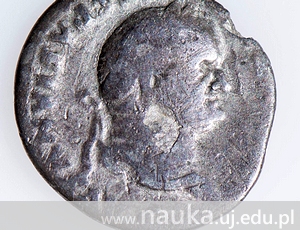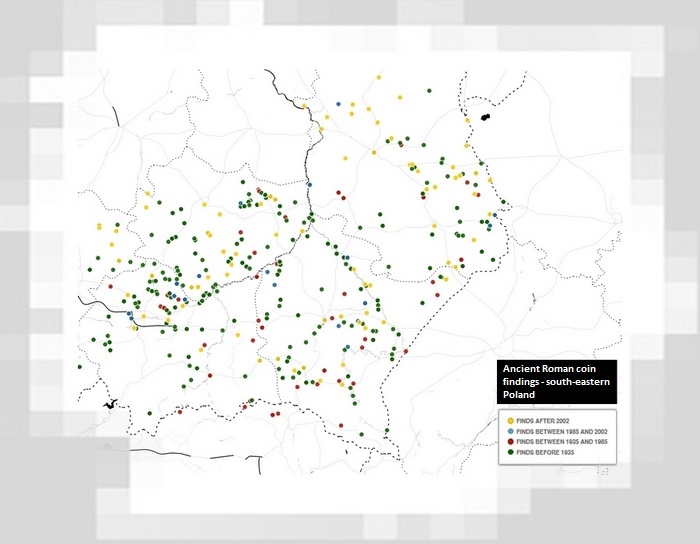
Scientists and students from the JU Institute of Archaeology are conducting a research project which aims to compile all known data related to ancient Roman coins found in the Małopolska region.
The research team, composed of Dr Jarosław Bodzek, Dr Kamil Kopij, Emilia Smagur, Paulina Koczwara, Szymon Jellonek, and Barbara Zając, is a part of a larger group led by Prof. Aleksander Bursche from the University of Warsaw. Its research encompasses all of Poland. Their project is entitled Finds of Roman Coins in Poland. Its main goal is to create an Internet database of Roman coin findings from the 3rd century BCE to the 5th century CE in Poland and its former territories: Eastern Galicia (now north-western Ukraine) and the Duchy of Prussia. Using the tools of digital humanities, the researchers enter verified data into the database.
‘Systematic cataloguing and publishing our findings in English allows us to present them to the scientific community worldwide. This way, researchers from all academic fields will be able to investigate the relations between the Roman Empire and the inhabitants of Barbaricum, both political and economic. The database will be an invaluable tool for analysing the influence of ancient Mediterranean civilisation on people living in the region’, explained Prof. Bursche.
 The database is scheduled to be completed in 2017. The researchers will look for information regarding ancient Roman coin findings and then enter it into the system. They will also have to verify the coins that are already a part of collections kept in museums and universities. Unfortunately, this is impossible in the cases of some findings from before World War II, since they were lost during the wartime chaos.
The database is scheduled to be completed in 2017. The researchers will look for information regarding ancient Roman coin findings and then enter it into the system. They will also have to verify the coins that are already a part of collections kept in museums and universities. Unfortunately, this is impossible in the cases of some findings from before World War II, since they were lost during the wartime chaos.
‘As of now, our database contains information on approximately 18,000 items. Roughly half of them have been found in southern Poland’, said Dr hab. Jarosław Bodzek. ‘It shows that this region was very closely tied with the Roman Empire’, he added.
The constantly-updated database will soon become a great tool for numismatists and archaeologists, who previously had to collect and digitalise the information the gathered by themselves. It won’t be long before this long and arduous process will be replaced by a simple query. Consequently, mapping the finds as well as performing quick statistical analyses will become possible. Implementing the linked data mechanism will allow the researchers to combine the data they acquire with other databased, such as the Oxford Coin Hoards of the Roman Empire Project.
The unfinished database is already available here. Over time, more and more coins will be listed on the website. Since some of the data is very sensitive (e.g. it could reveal the location of priceless heritage objects to people who would try to steal them), not all information will be available to the public.
Original text: www.nauka.uj.edu.pl





